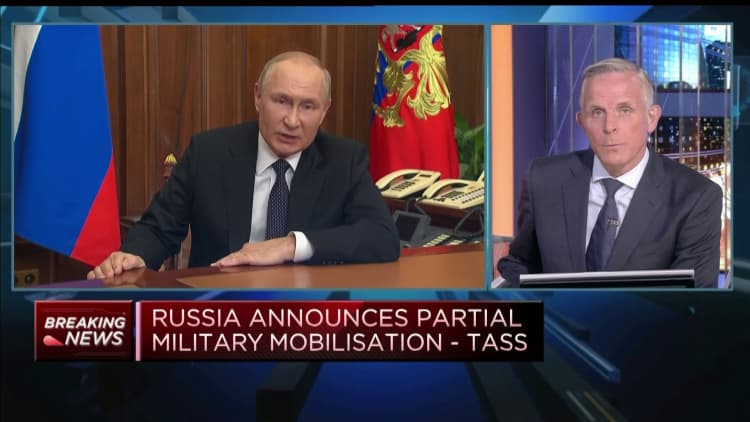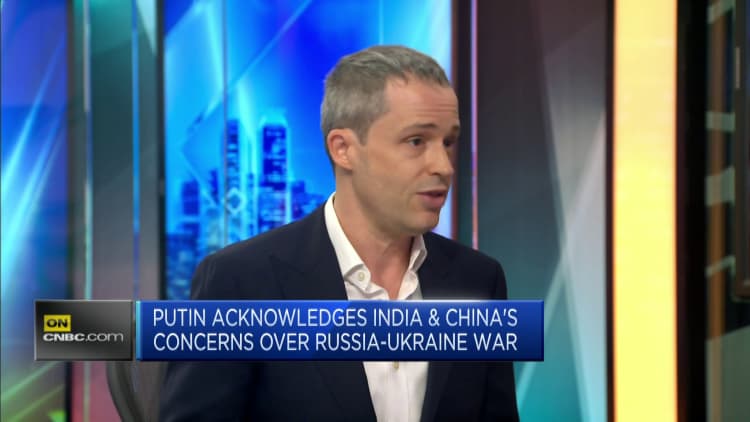Oil prices rise after Putin announces partial military mobilization
The UN Security Council is ‘imperfect and paralyzed’ but not dead, former delegate says
“The [United Nations] Security Council is imperfect and paralyzed, but it is not dead” said former U.S. delegate to the United Nations, Hugh Dugan.
Dugan’s comments come as world leaders gather for a UN General Assembly meeting in New York.
In response to a question of whether the UN body can still work without China and Russia, Dugan said that ministers from both countries will be present, and that the strength of the UN is in its “power to convene” and draw 160 world leaders to be present for a discussion.
“Those who don’t show up know that if they’re not at the table, they’re going to be on the menu,” Dugan added. It’s widely expected that the war in Ukraine and global food security will dominate discussions.
— Lee Ying Shan
‘Path to oblivion’: Ukraine military gains could deepen Russia’s economic problems
Russian President Vladimir Putin attends a meeting with Iranian President Ebrahim Raisi on the sidelines of the Shanghai Cooperation Organization (SCO) summit in Samarkand, Uzbekistan September 15, 2022.
Iran’s Presidential Website/wana | Reuters
Ukraine’s counteroffensive, which has seen the country’s forces recapture vast swathes of Russian-occupied territory, could be compounding Russia’s economic troubles, as international sanctions continue to hammer its fortunes.
After the Ukrainian military’s stunning success in recent weeks, which saw it recapture swathes of Russian-occupied territory in the northeast and south of the country, Berenberg Chief Economist Holger Schmieding suggested the losses could exert further economic pressure on Moscow.
“Even more so than before, the Russian economy looks set to descend into a gradually deepening recession,” Schmieding said in a note last week.
“The mounting costs of a war that is not going well for [Russian President Vladimir] Putin, the costs of suppressing domestic dissent and the slow but pernicious impact of sanctions will likely bring down the Russian economy faster than the Soviet Union crumbled some 30 years ago.”
– Elliot Smith
Putin announces partial military mobilization in escalatory move
Russian President Vladimir Putin on Wednesday announced a partial military mobilization in Russia, putting the country’s people and economy on a wartime footing as Moscow’s invasion of Ukraine continues.
In an unusual, pre-recorded televised announcement, Putin said the West “wants to destroy our country” and claimed it had tried to “turn Ukraine’s people into cannon fodder,” in comments translated by Reuters.
Putin has previously blamed Western nations for starting a proxy war with Russia in Ukraine and again threatened the West with a military response, saying Moscow had “lots of weapons to reply.”

He said “mobilization events” would begin Wednesday without providing many further details, aside from saying that he had ordered an increase in government funding to boost Russia’s weapons production.
A partial mobilization is a hazy concept but it puts Russia on a firmer war footing (it has not yet declared war on Ukraine, despite appearances, and calls its invasion a “special military operation”) but partial mobilization could mean that Russian businesses and citizens have to contribute more to the war effort.
— Holly Ellyatt
‘Sham’ votes in occupied regions on joining Russia are ‘doomed to fail,’ official says
Ukrainian officials have dismissed plans by Russian-occupied parts of the country to hold referenda on whether to join Russia, saying the move is “doomed to fail.”
Ukraine’s Foreign Minister Dmytro Kuleba said the “sham” votes on joining Russia — announced on Tuesday by Russia’s proxy leaders and officials installed in occupied parts of the country — did not change anything.
Yuriy Sak, an advisor to Ukraine’s Defense Minister Oleksii Reznikov, told CNBC Tuesday that such “fake” votes are “doomed to fail” for several reasons.
“This is the desperate, face-saving attempt which they’re trying to use to compensate for the humiliation that they have suffered on the battlefield as a result of the Ukrainian army’s counter offensive, both in Kharkiv region and in Kherson,” he said.
“The second point is that, regardless of what they do, this will not stop the Ukrainian army and this will not be recognized by any members of the international community.”
Sak said that most people in those regions did not support becoming a part of Russia, particularly after seeing how Russian forces had behaved during the conflict in which it has been accused of multiple war crimes. Russia denies it has targeted civilians or civilian infrastructure, despite evidence to the contrary.
Residents receive Russian passports in Kherson on July 21, 2022, amid the ongoing Russian military action in Ukraine.
Stringer | AFP | Getty Images
“The third, very important point is that local populations in the temporarily-occupied territories — and we’re seeing it now as we are de-occupying these territories — they are not supportive of the occupants. They’re not supportive of the aggressor. So these fake referendums are doomed to fail, from whatever angle or aspect you look at it,” Sak said.
— Holly Ellyatt
China’s Xi and India’s Modi were the last two people Putin wanted to see give him the cold shoulder

At last week’s Shanghai Cooperation Organisation summit in Samarkand, Uzbekistan, there were clear signs that China’s Xi Jinping and India’s Narendra Modi are growing wary of Russia’s invasion of Ukraine.
China and India like cheap oil from Russia, but New Delhi is concerned about food and energy insecurity. And Beijing is unhappy that its reputation is being dragged through the mud, especially among European countries.
— Ted Kemp
Germany’s Chancellor says Putin must recognize he can’t win in Ukraine
German Chancellor Olaf Scholz (SPD) addresses the delegates in the general debate at the 77th General Assembly of the U.N. The main topic of the General Assembly is the Russian war of aggression in Ukraine.
Michael Kappeler | dpa | Picture Alliance | Getty Images
Russian President Vladimir Putin will only give up his “imperial ambitions” that risk destroying Ukraine and Russia if he recognizes he cannot win the war, German Chancellor Olaf Scholz said on Tuesday.
“This is why we will not accept any peace dictated by Russia and this is why Ukraine must be able to fend off Russia’s attack,” Scholz said in his first address to the United Nations General Assembly.
The return of imperialism, with Putin’s war on Ukraine, was not just a disaster for Europe but for the global, rules-based peace order, the chancellor said. He called on the U.N. to defend this from those who would prefer a world where the “strong rule the weak”.
“Do we watch helpless as some want to catapult us back into a world order where war is a common means of politics, independent nations must join their stronger neighbors or colonial masters, and prosperity and human rights are a privilege for the lucky few?” Scholz asked.
— Reuters
Blinken calls Russian referenda attempts a ‘sign of weakness’ and a ‘sign of Russian failure’
US Secretary of State Antony Blinken speaks about US policy towards China during an event hosted by the Asia Society Policy Institute at George Washington University in Washington, DC, on May 26, 2022.
Jim Watson | AFP | Getty Images
Secretary of State Antony Blinken slammed the Kremlin’s attempt to hold a referendum in parts of Ukraine and called the move a “sign of Russian failure.”
“We’ve seen reports that Russia is now considering proceeding with these sham referenda in Ukraine, something we said that they were going to do for many months,” Blinken told reporters on the sidelines of the 77th United Nations General Assembly in New York City.
“That would then lead to them claiming the annexation of Ukrainian territory,” he said, adding that if the referenda proceeds, the United States will never recognize the outcome.
“The sham referenda and the potential mobilization of additional forces isn’t a sign of strength. On the contrary, it’s a sign of weakness, it’s a sign of Russian failure,” America’s top diplomat added.
— Amanda Macias
‘The Russians can do whatever they want. It will not change anything,’ Ukraine’s Kuleba says
Minister of Foreign Affairs of Ukraine Dmytro Kuleba attends a joint media briefing amid Russia’s invasion of Ukraine, in Odesa, Ukraine 14 September 2022.
Nurphoto | Getty Images
U.S. Ambassador to the United Nations Linda Thomas-Greenfield met with Ukrainian Foreign Minister Dmytro Kuleba on the sidelines of the high-level General Assembly in New York City.
The meeting between Thomas-Greenfield and Kuleba, their second since Russia’s war broke out in late February, comes as the Kremlin attempts to hold referendums in Russian-controlled Ukrainian cities. The move is expected to set the groundwork for Russian troops to annex additional parts of the country.
The White House said the outcome of the votes in Luhansk, Kherson, Zaporizhzhia and Donetsk will likely be manipulated in Russia’s favor and will therefore not be acknowledged.
“The Russians can do whatever they want. It will not change anything,” Kuleba said alongside Thomas-Greenfield.
— Amanda Macias
Putin postpones surprise speech to Russians for unknown reasons
Russian President Vladimir Putin chairs a meeting with members of government via a video link in Moscow, Russia August 31, 2022.
Gavriil Grigorov | Sputnik | via Reuters
Russian President Vladimir Putin failed for unknown reasons to deliver a nationally televised speech that would have been his first since the invasion of Ukraine earlier this year.
Putin has postponed the speech, which was expected to discuss the situation in Ukraine, until Wednesday, according to a Telegram post by Sergei Markov, a former advisor to the Russian leader,
“Go to sleep,” wrote Margarita Simonyan, the editor of RT, a Russian state media outlet, on her own Telegram account.
– Dan Mangan


